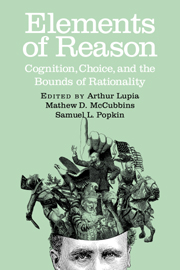Book contents
- Frontmatter
- Contents
- List of Tables and Figures
- Acknowledgments
- List of Contributors
- Beyond Rationality: Reason and the Study of Politics
- PART I EXTERNAL ELEMENTS OF REASON
- PART II INTERNAL ELEMENTS OF REASON
- 8 Reconsidering the Rational Public: Cognition, Heuristics, and Mass Opinion
- 9 Three Steps toward a Theory of Motivated Political Reasoning
- 10 Knowledge, Trust, and International Reasoning
- 11 Coping with Trade-Offs: Psychological Constraints and Political Implications
- 12 Backstage Cognition in Reason and Choice
- 13 Constructing a Theory of Reasoning: Choice, Constraints, and Context
- References
- Author Index
- Subject Index
9 - Three Steps toward a Theory of Motivated Political Reasoning
Published online by Cambridge University Press: 05 June 2012
- Frontmatter
- Contents
- List of Tables and Figures
- Acknowledgments
- List of Contributors
- Beyond Rationality: Reason and the Study of Politics
- PART I EXTERNAL ELEMENTS OF REASON
- PART II INTERNAL ELEMENTS OF REASON
- 8 Reconsidering the Rational Public: Cognition, Heuristics, and Mass Opinion
- 9 Three Steps toward a Theory of Motivated Political Reasoning
- 10 Knowledge, Trust, and International Reasoning
- 11 Coping with Trade-Offs: Psychological Constraints and Political Implications
- 12 Backstage Cognition in Reason and Choice
- 13 Constructing a Theory of Reasoning: Choice, Constraints, and Context
- References
- Author Index
- Subject Index
Summary
The human understanding, when it has once adopted an opinion … draws all things else to support and agree with it. Though there may be (more) instances to be found on the other side, yet these it either neglects or despises, or else by some distinction sets aside and rejects.
–Francis Bacon, New Organon (1621)In this essay we propose a theory of motivated reasoning that can account for why both ordinary citizens and political sophisticates are prone to follow Bacon's dictum. Three subtheories – hot cognition, online processing, and a “how-do-I-feel?” heuristic – working together, provide a three-step mechanism for how we believe citizens think and reason about political leaders, groups, and issues.
This tripartite theory of motivated reasoning starts with the notion that all social concepts are affect laden; all social information is affectively charged (Bargh 1994, 1997; Fazio, Sanbonmatsu, Powell, and Kardes 1986; Fazio and Williams 1986; Lodge and Stroh 1993; Taber, Lodge, and Glathar 2000). This is the hot cognition hypothesis (Abelson 1963). Specific to politics, all political leaders, groups, issues, and ideas you have thought about and evaluated in the past are now affectively charged – positively or negatively, strongly or weakly – and this affective tag is stored directly with the concept in long-term memory.
On-line processing (Anderson and Hubert 1963; Lodge, Steenbergen, and Brau 1995; Park and Pennington 1986) is a mechanism for updating the value of affective tags attached to concepts in memory.
- Type
- Chapter
- Information
- Elements of ReasonCognition, Choice, and the Bounds of Rationality, pp. 183 - 213Publisher: Cambridge University PressPrint publication year: 2000
- 308
- Cited by

